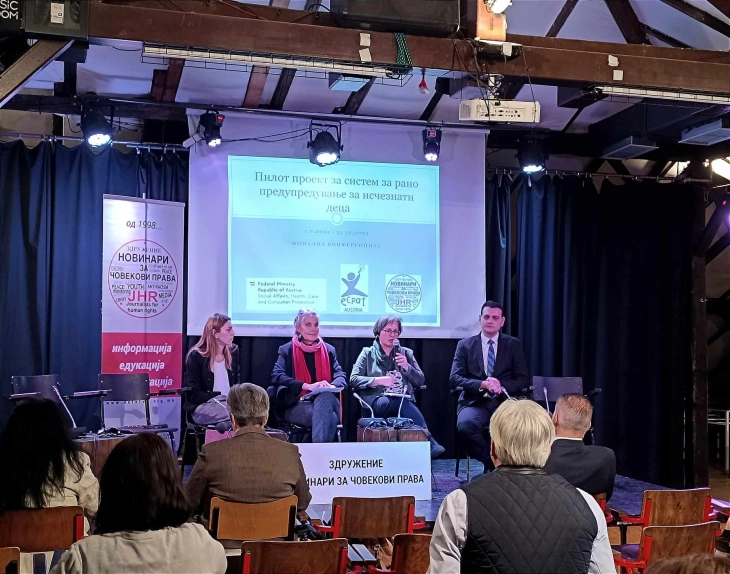Launch of missing children early warning system website najdime.org.mk
- The website for the early warning system for missing children www.najdime.org.mk has been launched Monday at the closing conference of pilot project ‘Early warning system for missing children’ organised by CSO Journalists for Human Rights (JHR) in cooperation with partner organisation ECPAT Austria.

Skopje, 18 December 2023 (MIA) – The website for the early warning system for missing children www.najdime.org.mk has been launched Monday at the closing conference of pilot project ‘Early warning system for missing children’ organised by CSO Journalists for Human Rights (JHR) in cooperation with partner organisation ECPAT Austria.
The website is available in three languages - Macedonian, Albanian, and Romani, and it will operate with the support of the Ministry of Internal Affairs.
The main goal is to improve the existing approaches and to find new methods for the prevention, investigation and mitigation of trafficking of human beings and children, as well as to protect or strengthen the rights of those affected by exchanging experiences and acquiring new knowledge.
The project is being implemented from 1 July 2021 to 31 December 2023, with financial support from the Austrian Federal Ministry for Social Affairs, Health, Care and Consumer Protection.
Minister of Education Jeton Shaqiri, speaking at the conference opening, underscored that the disappearance of a person without a trace always provokes significant concern and fear among family members, friends. These emotions, combined with the most pronounced one at the moment—helplessness, have the potential to lead to hurried and thoughtless actions.

Expressing hope that this initial version of the system being presented today will be effective, indicating that everyone should commit to its continuous improvement in the future, especially by incorporating positive experiences from developed countries.
Reminding that North Macedonia has ratified the UN Convention on the Rights of the Child, he emphasized that the stance on this issue can be strengthened, among other things, precisely by establishing and implementing such a tool.
Shaqiri underscores the crucial role of the educational system in early detection of missing children, with the Ministry of Education and Science dedicating its entire capacity to the advancement of this system.
“Teachers and school staff are typically the first to notice when a child is absent or to identify when they may be at risk, as reflected in their behavior and appearance. On the other hand, it is in schools, through academic lessons and extracurricular engagements, that children learn about potential hazards,” Shaqiri said.
He noted that the Ministry of Education will continue its efforts to enhance the safety of students, both within and outside school premises, in cooperation with other competent institutions such as the Ministry of Interior. Additionally, local self-governments, the schools themselves, and partner organizations will be involved.
Toni Angelovski, Assistant for Public Relations at the Ministry of Internal Affairs, highlighted during the conference that the security of the state is not exclusively the responsibility of the police. He emphasized that it is a collective effort, and everyone must contribute to ensuring a safer country.
“This is a classic example of collaboration with civil organizations that will contribute to greater security. Of course, we are working continuously to implement this system, and all necessary steps must be taken to fully implement it,” Angelovski said.
The project coordinator and journalist for human rights, Aleksandra Radevska, noted that the website www.najdime.org.mk, a component of the early warning system for missing children, will function on a reporting principle that users can fill out on the website.
“Upon receiving information and a report from the family of a missing child, we submit the information through our contact person at the Ministry of Interior. If the disappearance has also been reported there, we publish the report on our website and share it extensively through all communication channels, including social media and the channels established in our partnership, which currently include: Komercijalna Banka, the Association of Hoteliers and Restaurant Businesses receiving information at their reception desks, the Taxi Services Group of Skopje, and the Public Transportation Enterprise of Skopje,” Radevska said.

She emphasized that the alerting, or widespread public notification for missing persons, is intended to be activated only in cases of kidnapping or when there is a high risk to the life of the missing person.
The conference underscored that the phenomenon of disappearances and the risks associated with child disappearance are emerging trends in modern society. These challenges encompass various forms of violence, including online violence, physical abuse, and psychological maltreatment. While these issues affect all segments of society, children are identified as the most vulnerable category.
A section of the project is devoted to marginalized groups, particularly Roma children and those from socio-economically at-risk families. The focus is on enhancing capacities and recognizing the challenges within these vulnerable categories.
Moreover, the other achievements from the project activities over the past two and a half years were showcased, accompanied by recommendations to institutions. Discussions involving all relevant stakeholders, including representatives from institutions, businesses, and experts, focused on the benefits of exchanging experiences, facilitating inter-institutional information exchange, and supporting the alarm system to minimize the risk of child disappearance and expedite the process of locating them.
Photo:MIA







